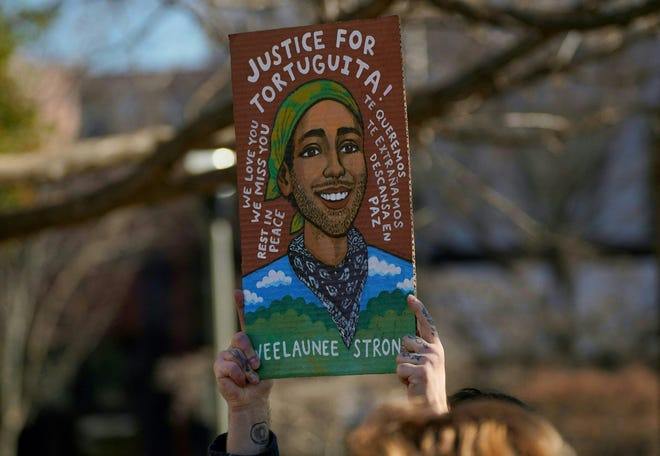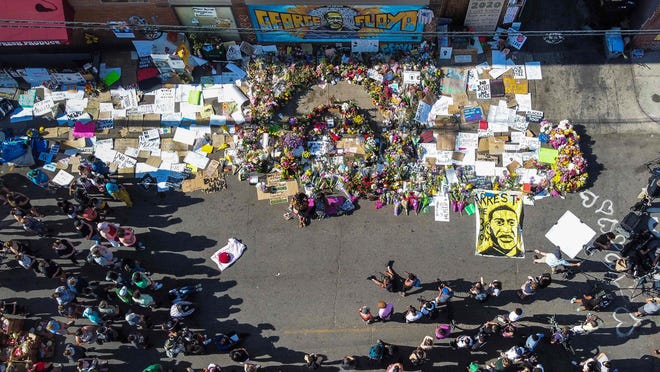A proposed public safety training center set to be built in a forest near Atlanta has sparked months of protests from activists who say the project will damage the environment and contribute to the militarization of police.
At the start of a “week of action” planned by activists, dozens of people were detained and many were charged with domestic terrorism after a crowd burned vehicles and set off fireworks, according to Atlanta police. A coalition of law enforcement agencies claim the groups are terrorizing project workers and endangering local residents.
Domestic terrorism is felony that carries up to 35 years in prison.
The arrests come amid outrage over the death of a 26-year-old environmental activist who was killed by police after allegedly shooting a state trooper while officials were clearing the area, according to law enforcement.
What is the Atlanta Public Safety Training Center, or ‘Cop City?’
The Atlanta Public Safety Training Center, dubbed ‘Cop City’ by its opponents, is a $90 million, 85-acre training space, according to the Atlanta Police Foundation.
The facility is expected to include classrooms, a shooting range, a mock city for “burn building” and “urban police” training and a course for emergency vehicle driver training, according to the city. Officials said the remaining 265 acres of the property, which until 1995 served as the Old Atlanta Prison Farm, will be preserved as “greenspace.”
Atlanta Mayor Andre Dickens has said that the tract is filled with rubble and overgrown with invasive species, not hardwood trees.
The first phase of the center, funded by the Atlanta Police Foundation according to city officials, is expected to open later this year.
Why are activists protesting?
Activists have been occupying the area since late 2021 in an attempt to halt the project’s development.
A coalition of environmental groups said in a letter to the Atlanta City Council the project will jeopardize the South River Forest, which is surrounded by primarily Black and Hispanic communities and “is our best hope for resilience against the worst impacts of climate change.”
“Balanced and equitable consideration must be given to the protection of the local ecosystem, the cultural and historical significance of the property, and health and wellbeing of the residents of the surrounding neighborhoods,” Jacqueline Echols, the board president of the South River Watershed Alliance, said in a statement.
The project will also “hyper-militarize law enforcement,” according to the Defend the Atlanta Forest Movement.
Protests erupted again in Atlanta in January after an activist was fatally shot by police. Gov. Brian Kemp declared a state of emergency during those protests.
Family demands answers after activist killed during protest
Manuel Esteban Paez Terán, also known as “Tortuguita,” was killed Jan. 18 after allegedly shooting a state trooper while authorities were clearing people out of the area, according to law enforcement.
Mike Register, head of the Georgia Bureau of Investigation, said officers found Tortuguita inside a tent and gave verbal commands. Tortuguita “did not comply” and suddenly shot a trooper in the abdomen, leading law enforcement officers to return fire, according to the GBI.
No body camera or dash camera footage of the shooting exists, according to the bureau. Activists and Tortuguita’s family have questioned law enforcement’s description of the incident and urged officials to release more information.
“The family needs answers,” family attorney Jeff Filipovits said at a press conference last month. “So far we’ve had selective information released by the GBI. They are not answering questions. They are not providing the family with any information to understand what happened in the forest on January 18.”

Why are protesters being arrested?
Sunday, 35 people were detained and 23 of them were charged with domestic terrorism, according to the Atlanta Police Department. Police said more than a hundred protesters dressed in black breached the site and threw bricks, large rocks and Molotov cocktails at police officers.
The day Tortuguita was shot, seven people were arrested and charged with domestic terrorism and criminal trespass, according to the GBI. Law enforcement said about 25 campsites were removed and officials found “mortar style fireworks, multiple edged weapons, pellet rifles, gas masks, and a blow torch.”
Late last year, five people were arrested and charged with domestic terrorism and other charges at the site. DeKalb County District Attorney Sherry Boston said the arrests were linked to “violent acts and trespassing.”
Dig deeper
Contributing: Grace Hauck, Natalie Neysa Alund and Camille Fine, USA TODAY; The Associated Press
Contact Breaking News Reporter N’dea Yancey-Bragg at nyanceybra@gannett.com or follow her on Twitter @NdeaYanceyBragg


